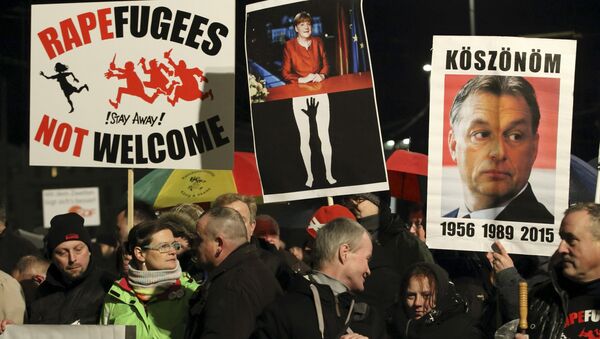A survey carried out by German broadcaster ARD suggests 51 percent of people are against Merkel's open door policy to refugees amid revelations that hundreds of women suffered attacks and sexual assaults in Germany on New Year's Eve.
Skeptics gaining ground in Germany in poll. 50% "afraid of that many refugees", 51 % say "we won´t be able to cope" pic.twitter.com/bRRwTRHECI
— Thorsten Benner (@thorstenbenner) January 15, 2016
Twenty-two suspects out of 32 men alleged to have been involved in the Cologne attacks are asylum seekers, according to the German Interior Ministry.
Many members of Merkel's coalition partner, the Social Democratic Party (SPD) fear the influx of refugees in 2016 will put a strain on the country's economy. They are also calling for tougher punishments for asylum seekers who commit crimes.
"We can handle the one million who came in 2015, but we won't be able to handle it if another million come in 2016," Sigmar Gabriel, head of the SPD party told German broadcaster ZDF.
Feelings towards refugees and asylum seekers have soured since the beginning of the year after the attacks on women on New Year's Eve. Masked vigilante groups have taken matters into their own hands, marching through Cologne carrying "rapefugees not welcome" placards.
Syrians in Germany w/ signs saying ‘Syrian refugees against sexual harassment’, re: Cologne https://t.co/AtAgT1wmf2 pic.twitter.com/t0ITFHn5fB
— Sunny Hundal (@sunny_hundal) January 17, 2016
Meanwhile, a group of refugees gathered in Cologne holding posters apologizing for the migrant sex attacks saying, "Syrian refugees against sexual harassment."
"Things have changed in Cologne. Where we once had smiles, you can see in people's faces they are suspicious of us now, they are not smiling anymore," Rehab Hassoun, a Syrian refugee told London newspaper The Times.
Rehab's brother Shacker Hassoun told reporters it was "social terrorism."
"This sexual abuse was social terrorism. I fled Syria because of terrorism and I was very sad that it should happen here, especially on a special occasion," Shacker Hassoun said.
However, it's not just many people in Germany turning their backs on Merkel's refugee policy. Many European governments are being accused of turning their backs on refugees too.
New research carried out by human rights group Amnesty International (AI), suggests women and girl refugees experience violence, assault, exploitation and sexual harassment throughout their journey — as well as on European soil.
Harassment of women refugees, Europe's forgotten sexual assault victims: https://t.co/a2JVd5eXik pic.twitter.com/jHCJ9WT5ef
— Amnesty UK (@AmnestyUK) January 18, 2016
Women refugees say they have experienced sexual harassment and assaults from people smugglers. Others reported filthy conditions in transit camps with squalid and unsegregated toilet facilities.
The AI report says some women experienced violence from other refugees as well as officials, especially when tensions rose in cramped conditions and police and security forces had to intervene.
"It was full of cages and there wasn't any air coming in. We were locked up. We stayed there for two days," Rania a 19-year-old pregnant woman from Syria told AI about her experience in Hungary.
"On our second day there, the police hit a Syrian woman from Aleppo because she begged police to let her go."
In Greece, a 16 year-old-girl from Syria reported being attacked with sticks.
"People started screaming and shouting, so the police attacked us and was hitting everyone with sticks," Maryam said.
"They hit me on my arm with a stick. They even hit younger kids. They hit everyone even on the head. I got dizzy and I fell… a police officer saw my arm and laughed."
With more than a million more people expected to arrive in Germany this year, the behavior and treatment of refugees and asylum seekers either in camps or in cities remains under heavy scrutiny while EU leaders squabble over quotas, leaving vigilante groups to take matters into their own hands.




